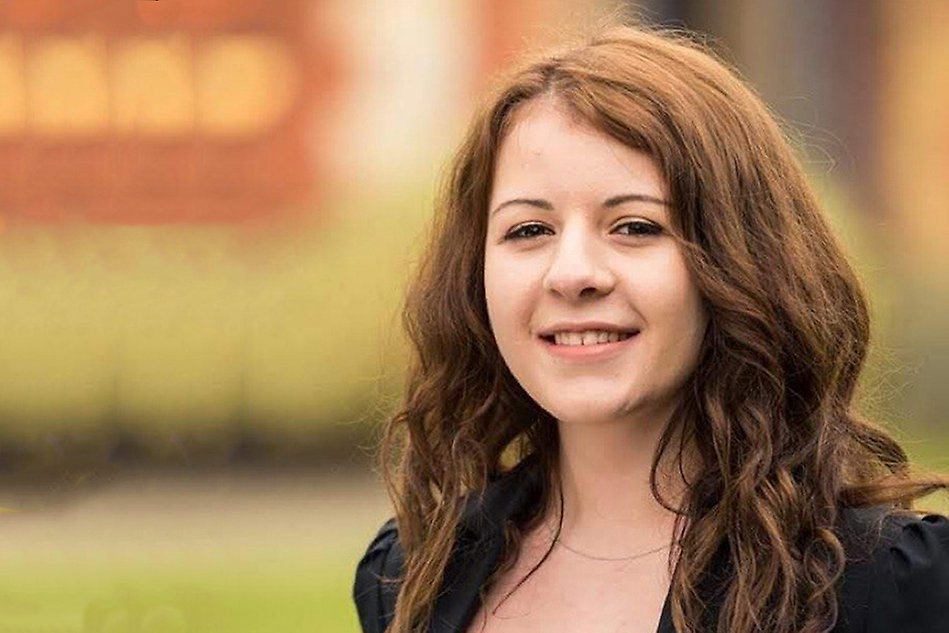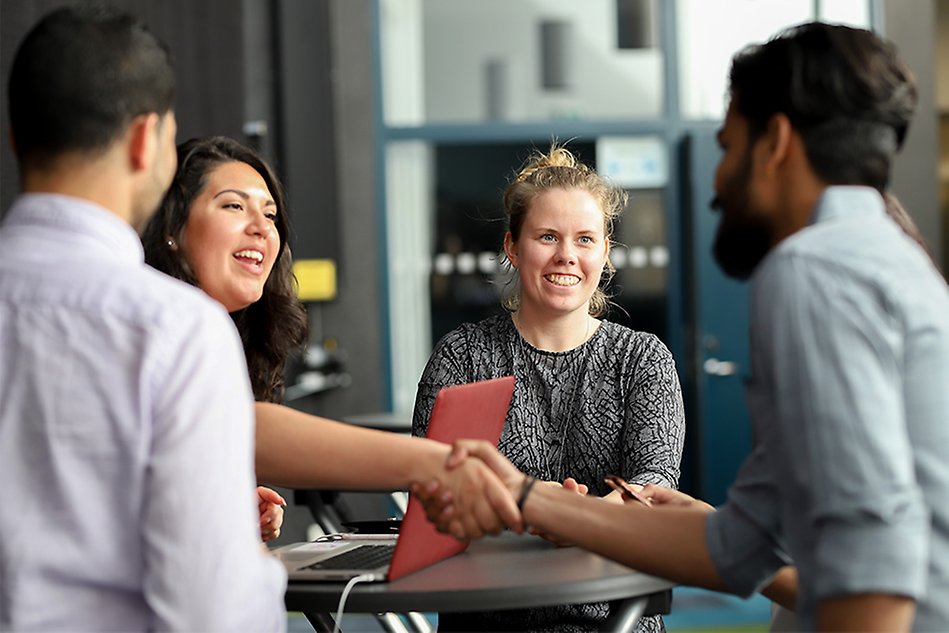From Master’s Programme in Nordic Welfare to labour market integration consultant
Alexandra Oancea studied our Master’s Programme in Nordic Welfare, and now works with labour market integration at the municipality of Örkelljunga. We asked her a few questions about her current job and how what she learned in the Master’s programme is useful in her daily tasks.

Alexandra was very proactive during her study time and started to look for jobs long before she graduated from the Master’s Programme in Nordic Welfare.
”I answered him very confidently, ’As Pippi Longstocking said, I've never tried that before, so I think I should definitely be able to do that'. The recruiter smiled, and I knew at that moment that I had convinced him that I was the right person for the job.”
How did you end up in your current position?
I started to look for jobs long before I graduated from my Master’s studies. I always knew I wanted to work in the public sector, working with and for people. I knew that I needed to start applying early to be able to gain that experience of an interview in Swedish. I did not expect to get a job before I graduated, but I thought being rejected was an important part of the process, to be able to learn and perform better in the next interview. After each interview I asked the recruiter for feedback and used this information to improve.
I actually applied for my current position on three different occasions – once in January, then in March and once again in May. The second time I applied, I got the chance to do an interview, but I was unfortunately rejected because of my lack of experience. They called me back for another interview in May and by that time I was much better prepared, due to experience from several other interviews during the spring. During this third interview, the recruiter told me he was concerned about the fact that the job will involve challenging tasks such as working with people with different problematic backgrounds and asked me how I would deal with this without any previous experience in the area? I answered him very confidently: ”As Pippi Longstocking said, I've never tried that before, so I think I should definitely be able to do that.” The recruiter smiled, and I knew at that moment that I had convinced him that I was the right person for the job.
How is a regular day at work?
I usually work with 10 to 20 people at a time, offering them coaching and helping them on their way to the Swedish labour market. At the moment I spend most of my time online and on the phone, since we are not allowed to meet people in person. Sometimes I get to visit a client who is doing an internship to see how it is going and how it can be improved. My work involves cooperation with different institutions in Sweden such as Arbetsförmedlingen, Försäkringskassan, Utbildningscentrum and different parts of the Örkelljunga Municipality. We all need to cooperate in order to ensure that my clients get the best possible help. My work is full of energy and challenges, and that is what I love about it. Working together with my colleagues, coming up with new ideas and sharing experiences and opinions are the highlights of the day. We are usually using our fika breaks to talk about what we can do better and how we can improve our work. I am very lucky to have such an amazing work place and great colleagues that I don’t really need a break from.

Alexandra took part in the extracurricular Student Experience and Employability Programme (SEEP), which helped her prepare for a career in Sweden.
In what ways can you take advantage of what you learned during your education at Halmstad University in your current position?
My Master's degree has given me the knowledge of how the Swedish welfare system works, which is key to be able to understand my job. During my education I got the chance to discover different ways of working in the public system, such as leading with equality and inclusivity, which I am trying to apply to my work routine everyday. All the theory of the programme is applicable to my job, and I see it as a sort of 'idea bank' when working with my daily tasks.
During my studies I also took part in the extra-curricular Student Experience and Employability Programme (SEEP), which opened up my eyes to different opportunities in Sweden and helped me prepare for a career in Sweden. The programme offered a forum where I could practice being 'a professional' as I got the opportunity to speak to different employers and learn how to build my personal brand. In addition to this, I recieved invaluable guidance and motivation from the project leaders of SEEP, which I'm very thankful for.
Give your top 3 advice for making the most of your Master’s studies?
1. Spend your time wisely
Start applying early for jobs. Even if there are limited chances to get a job before finishing your studies you will get a chance to practice your interview skills and how to reply to a phone call from an employer. You will find ways to improve your CV and personal letter and you will make your name known. When finding a company or position you want, don't be afraid to apply several times. The second time you apply the employer will hopefully remember your first application, and consider you a motivated and determined candidate.
2. Select your Master thesis project carefully
Use your Master’s thesis as a tool to build your career. Be open to different possibilities and be flexible when looking for companies or organisations to collaborate with. Perhaps this will be your future work place.
3. Take the opportunity to build a professional network
Create your own opportunities, do not wait for someone to give them to you. Start networking, be active on LinkedIn, contact employers and make a name for yourself. Show them who you are even if they have not asked for that. It is about making your own success.
What are your future career goals?
I want to continue working with integration in the labour market, but my dream is to have my own business as a consultant within the public sector. I want to focus my work on integration of people with disabilities in the labour market, where my role would be to work as a bridge between the people, the public sector and the employers. I am aware this is a big dream, but I'm taking small steps towards it every day.
Quick facts
- Name: Alexandra Oancea
- From: Romania
- Education at Halmstad University: Master's Programme in Nordic Welfare
- Current company and position: Örkelljunga kommun, Labour market integration consultant
- Professional background: Bachelor’s degree in Political Sciences, University of York, UK. Leader of a student organisation – Model United Nations York (working with diplomacy, international politics, human rights). Work experience with children and adults with disabilities.

